“Water, water everywhere, nor any drop to drink”
–The Rime of the Ancient Mariner, a poem by Samuel Taylor Coleridge
Water, the most essential element to sustain life on the planet, might be roaring in the seas, but for billions of life forms on land, it is a scarce commodity. By water, I mean freshwater which is needed for drinking, cleaning and sanitation, leading to healthy ecosystems.
The major causes of shrinking freshwater ecosystems are rampant development, without looking at long term impact, and growing populations. Added to this is the accelerating climate change crisis, with a high frequency of water-related disasters such as floods, storms and droughts.
Billions of people do not have access to clean water. The need of the hour is an urgent call for action, collective action, in which communities, corporates and governments work together to execute sustainable solutions that make water accessible for future generations as well.
Water For All, All for Water
Highlighting the need for water conservation, Viva con Agua (India) and Welthungerhilfe in partnership with Goethe Institut, Max Mueller Bhavan, Delhi, organised an arts festival on WASH (Water, Sanitation and Hygiene)–Water for All, All for Water.
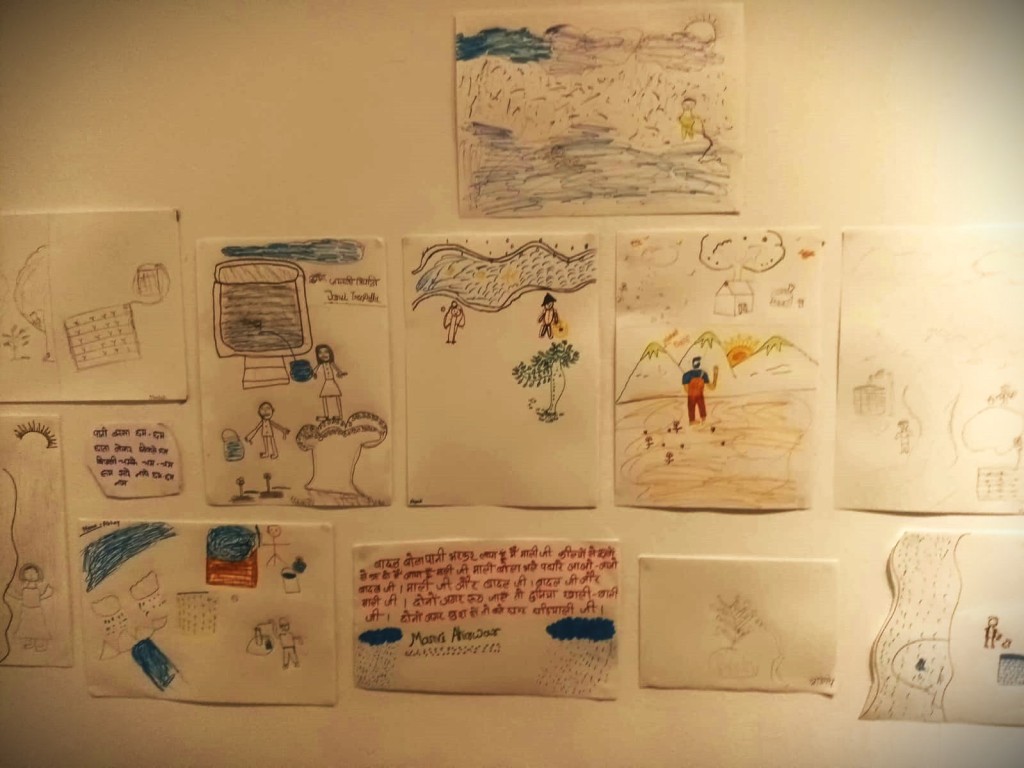
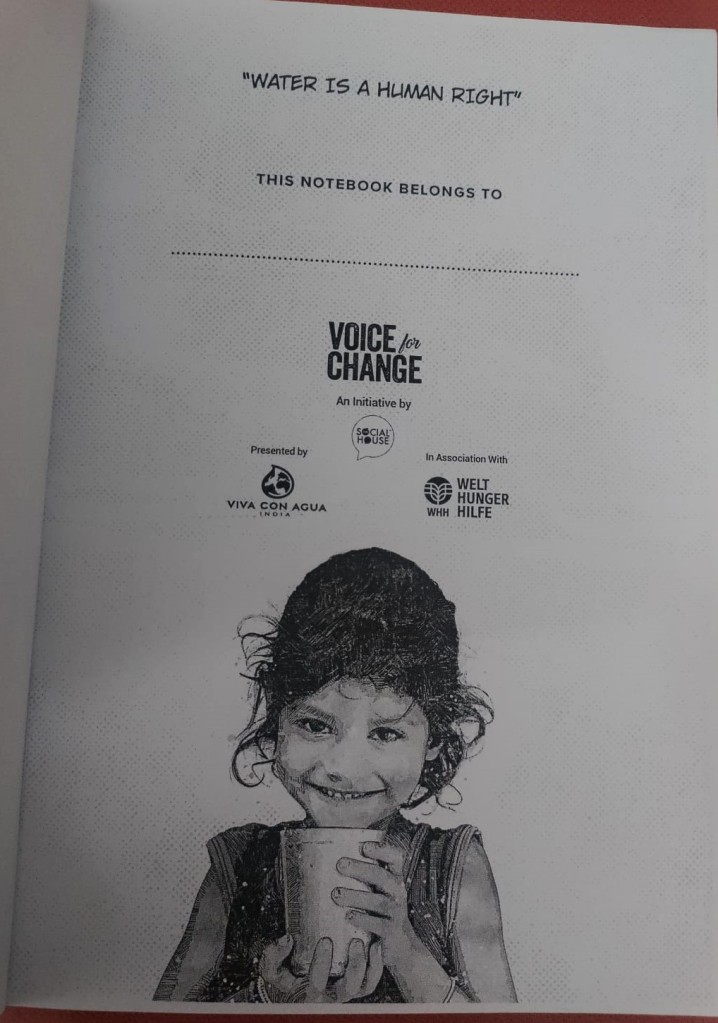
“Sports, arts, music are universal languages, reaching the masses, touching their hearts and motivating people in a joyful manner,” said Sophie Mehner, Programme Directress, Viva con Agua ARTS gGmbH. The aim is to be a bridge between societies, rural and urban, to find executable solutions for long-term rewards. Their initial ‘universal languages approach’ project took off in Madhya Pradesh and the highlights were showcased in the festival in Delhi.
The non-profit organises an annual MILLERNTOR GALLERY festival in Germany with focus on social causes. This was the first edition of the festival in Delhi, India. Viva con Agua is working on 11 projects in Africa, India and Nepal.
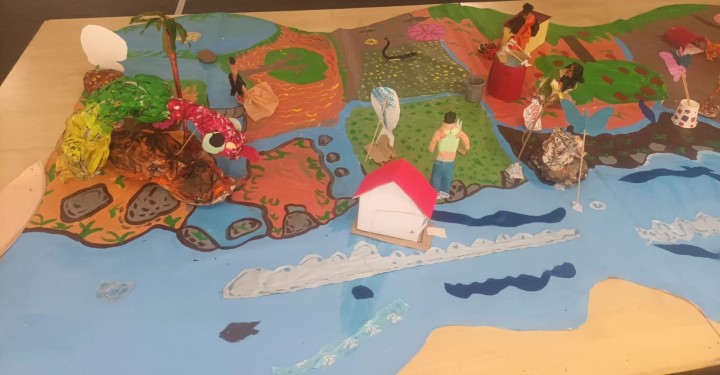
Not many would read or easily decipher the scientific reports, but the sound of music, the rhythm of dance and the hues of art catch the heart and mind of one and all. “Culture is a great approach to spread awareness,” said H.E. Dr Philipp Ackermann, German Ambassador to India and Bhutan.
Access to clean water is a basic human right, as stated by the United Nations. Nivedita Varshneya, Country Director, Welthungerhilfe, India, said, “How many of us think of rainwater harvesting in the neighbourhood, or the long walks women in villages take to fetch clean water. The festival reminds us of our shared responsibility for ensuring equitable and clean water for all. For sustainable water management, partnerships between all sections of society are needed.”
Let Water Unite Us
Talking about the initiative, Dr Maria Stukenberg, Region Director South Asia, Goethe Institut, Max Mueller Bhawan, Delhi, said that the institute supports sustainability, local and noble projects.
The library of Goethe Institut reverberated with the sound of folk songs of Jharkhand, sung by Megha Sriram Dalton, accompanied by Abhishek Shama, Puneet Tanwar and Raja Sinha. It had the feet tapping and set the heart in motion.
A panel discussion between Rajendra Singh, the waterman of India, and water conservationist Sanjay Singh, moderated by academician Yogesh Kumar, was a revelation on the waterman’s efforts to bring water to the stressed communities in Rajasthan.
Rajendra Singh talked about his work which spans over 42 years. During the 1980s, his work started in the water-stressed region of Rajasthan, his native state. Singing a folk song, he highlighted how lack of water displaces families, dries up their resources and impacts basic living.
After years of working with panchayats, local governments, he said that now the people sing another song, narrating the coming back of families to their native homes, a better agricultural produce and a happier life.
Singh talked about water being essential for Nature as well, and how by changing the flow of rivers, the damage was intensifying. “During my childhood, we used to walk by the river, feel its vibrations and watch the colours changing with each curve. The younger generation now needs to take the baton and herald the natural flow, link our head and heart with water.”
Change involves governments taking hard decisions such as policy changes or a different approach to development, do more research, find alternatives.
There was also a ‘Jal Jeevan Exhibition’ in which children from various Indian communities and international artists had come together to show the different ways in which water impacted our lives.
Spread over two days, the festival also had reading sessions, workshops, panel discussions, play, poetry and storytelling sessions, music performances by national and international artistes.
Save blue. Live green
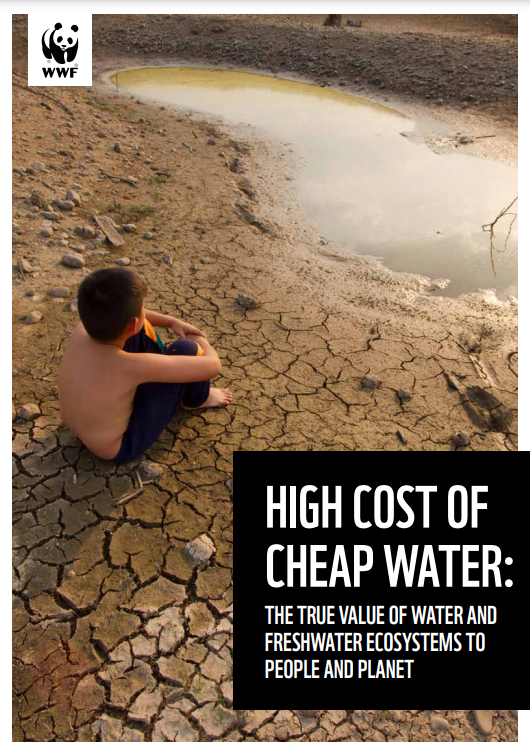
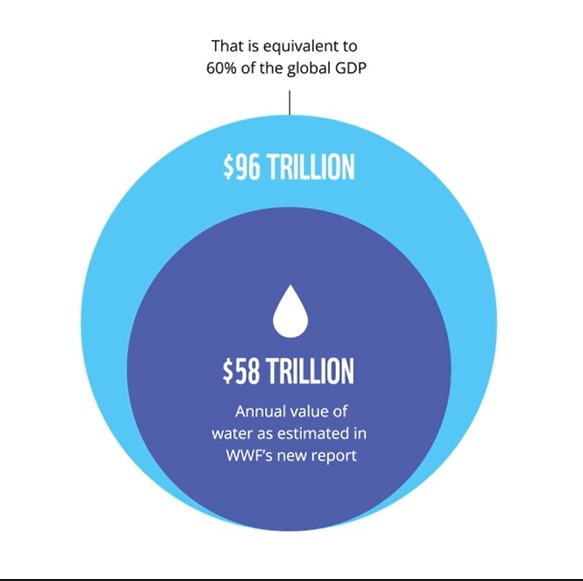
WWF’s recent report, High Cost of Cheap Water: The True Value of Water and Freshwater Ecosystems to People and Planet, is a shaker, warning us about the economic impact of the water crisis.
“First ever annual estimate of economic value of water and freshwater ecosystems is $58 trillion – equivalent to 60% of global GDP
Degradation of rivers, lakes, wetlands and aquifers threatens their economic value and their irreplaceable role in sustaining human and planetary health”
Why is there a water crisis if 97% of the water is in the ocean?
Seawater contains about 3.5% salinity (mostly sodium chloride). This quantity of salt is too high for the human kidneys to process and eliminate, leaving a dangerous surplus of salt in the body.
Another 2% is frozen in icecaps and glaciers. Almost 30% is in the form of groundwater.
Only 1% is accessible in the form of rivers, lakes and ponds. Only this 1% can be used for drinking.
What is threatening freshwater ecosystems?
Developers view “rivers as mere pipes, wetlands as just wastelands to be converted, and aquifers as resources to pump and pollute without problem. This blinkered approach has caused huge problems,” reports WWF. “We’ve lost 1/3rd of our remaining wetlands in the last 50 years, only 1/3rd of long rivers is still free flowing.”
Shifting rainfall patterns and river flows will impact water supplies as well as rain-fed and irrigated agriculture, along with businesses and entire economies.
Freshwater ecosystems are home to 10% of all known species, despite covering just 1% of Earth. One third of vertebrate species, including more than half of all known fish species, are supported by freshwater habitats. But 1/3rd of freshwater species are now threatened with extinction. There is a staggering 83% decline in freshwater species populations since 1970.
What is the role of freshwater ecosystems?
Healthy freshwater ecosystems act as natural defences against extreme floods and droughts.
Sediment flows sustain mangroves and keep densely populated deltas above the rising seas.
Rivers support 1/3rd of global food production and sustain freshwater fisheries that feed 200 million people, including indigenous people and local communities across Africa, Asia and Latin America.
Around 75% of irrigated crops are already grown in water-stressed areas. And this figure is rising, especially as unsustainable irrigation is making the situation worse – drying up rivers and lakes and emptying aquifers.
Agriculture currently accounts for over 70% of all the freshwater that people extract from surface and groundwater – irrigating cropland that produces 44% of the world’s food.
Awareness about Freshwater Ecosystems
Nature is not a machine that can quick service human needs. It has a cycle that takes time to restore. The solution lies in protecting, restoring and sustainably managing freshwater ecosystems to accelerate adaptation to the worsening water-related impacts of climate change.
Ensuring healthy freshwater ecosystems can sustainably feed up to 10 billion people, beyond irrigation.
This post is part of Blogchatter’s CauseAChatter.
This blog post is part of the blog challenge ‘Blogaberry Dazzle’ hosted by Cindy D’Silva and Noor Anand Chawla in collaboration with Dr. Preeti Chauhan.


Ambica, I must give it to you for the hardwork and effort that u put into your posts. They are so pro… i mean ofcourse you are a pro writer but you are so sincere with your work. The detailed research and the facts n figures you highlight are so impressive.
On a diff note, you know, I often wonder why scientists don’t come up with a way of purifying the water around us to make it drink worthy. I mean they may be doing it but if you can go to Mars, why can’t u do that… the most urgent and important thing?
Could it be a possibility?
LikeLiked by 1 person
How will RO companies survive then? On the other hand ..the quantity required for each locality is way too high. It’s a problem to do this much monitoring also. Human population has escalated its own issues by rapid multiplication of the species
LikeLiked by 1 person
I don’t know Ambica, it’s just something I often think about.
LikeLiked by 1 person
Ambica I have no words to appreciate you, you are just stupendously fantastic with so much knowledge on multiple subjects. The second thing that deserves a round of applause in your case is your perfection in penning down a critical topic in such informative and interesting way. I never asked you but want to ask today… what is your area of specialization? How can one be so talented in multiple subject. In residential societies or complex is really hard to implement a decent fresh water saving project. The reason is different people and different opinions and no common vision. I really wish people understand the nature cycle that takes time to restore things to give us for use. Very interesting and master piece work of yours. Congratulations dear.
LikeLiked by 1 person
Thank you for your kind words Samata. I have asked. Myself many times what is my expertise. And I am still searching. I need to work on what I like doing best and focus on that alone. It’s like being Jack of all trades and master of none. 😉
LikeLike
This is such a unique topic to talk about. Something needed and something we all mostly do not pay attention to. Raising up this topic brings me some thoughts if only we’re mindful of our behavior or actions, in everything, then we won’t be doing such acts that can drastically bring us to where we are nowadays where we need to conserve water. It’s like a no-brainer that we need it for survival yet we don’t put it into perspective when we use/waste it.
LikeLiked by 1 person
This is such a well-researched piece, Ambica. It is disheartening to see that we now have to buy water which was so easily available when we were kids. And after buying too, we are not sure about how clean it is. It is heartwarming to see organizations coming forward and talking about water conservation. In fact, today I see many school children speaking about ways to conserve water, although many adults are completely oblivious to this. It’s high time, we take this issue seriously and find ways to save water for a bright future for the generations to come.
LikeLiked by 1 person
Ambica, kudos to you for the dedication and hard work you put into your posts. This is a truly well-researched piece. It’s disheartening to realize that we now have to buy water. It’s sad to know that many people still lack access to clean water. We really need to take action. A big shoutout to Viva con Agua for organizing an arts festival to highlight Water, Sanitation, and Hygiene. It’s good to see how sports, arts, and music are bringing people together for such an important cause. Here in my kid’s school, such campaigns are held from time to time to teach kids the value of water.
LikeLiked by 1 person
So good to know about the school initiative. The earlier they are trained, the better it is for them to understand. We should have taken EVS classes more seriously
LikeLike
Brilliant post Ambica. No doubt you are talented and good writer offcourse you are journalist. Kudos to your hardwork and detailing on such a sensitive topic. My knowledge enhance. Regarding water I know the value and scarcity. I have faced almost for 6 years water shortage. Government and scientists should have to come up with realistic solution without political intervention.
LikeLiked by 1 person
I also hope they become really deeply serious about this .. the shrinking water tables and the lack of sanitation are not healthy
LikeLike
Your posts are always in-depth and well-researched. Many of us don’t realize what people go through for water because it is so easily available to us. Back in the late 80s when there was a severe drought in Hyderabad, we were sanctioned only 8 buckets of water a day for everything including toilets. It brought out the worst in people whenever the tanker came.
LikeLike
This is indeed eye-opening, Ambica. The horror stories we read and watch give us goosebumps. And then it is the likes of Jal Board wasting water. Regarding the water table, when we shifted here almost 20 years back, the water table was quite high. Now with all the borewells, it has reduced considerably. Just a matter of time.
LikeLiked by 1 person
Ur post about save water is definitely gonna touch many. Many of us are worried about saving water but don’t realize how to.
LikeLiked by 1 person
wow, glad you just did say protecting nature is a cycle to have it, preserve it and use it effectively. water conservation is the ideal topic some ecosystems thrive on water resources.
LikeLiked by 1 person
Our earth just has 1/4th of fresh water to drink and science is still working on filtering water of the ocean more over water is very important for every living thing and one of the musts for sustainability on earth. U have written it very well.
LikeLiked by 1 person
Amazing write-up once again. You have in-depth knowledge of everything. The way you described the issue and provided the pointers is really commandable. Great post, as always.
LikeLiked by 1 person
Your post highlights the scarcity of freshwater, emphasizing concerns due to rampant development and climate change. The creative arts festival for water conservation and the economic insights from the WWF report underscore the urgency. Emphasizing the need for collective action, communities and governments must work together for sustainable solutions and ensure water accessibility for future generations
LikeLiked by 1 person
Your article serves as a call to action, emphasizing the importance of protecting, restoring, and sustainably managing freshwater ecosystems. The challenges posed by climate change and growing populations require collaborative efforts from communities, corporates, and governments to ensure access to clean water for future generations. Thank you for shedding light on this crucial issue and promoting awareness about the value of water and freshwater ecosystems.
LikeLiked by 1 person
Your posts are well thought and well researched and hats off to you and your writing. This problem with water is often thought about but little we do about. Definitely on a large scale the authorities must take action as sooner or later this will be a huge problem.
LikeLiked by 1 person
An eye-opening post. Let’s hope the message reaches far and wide.
LikeLiked by 1 person